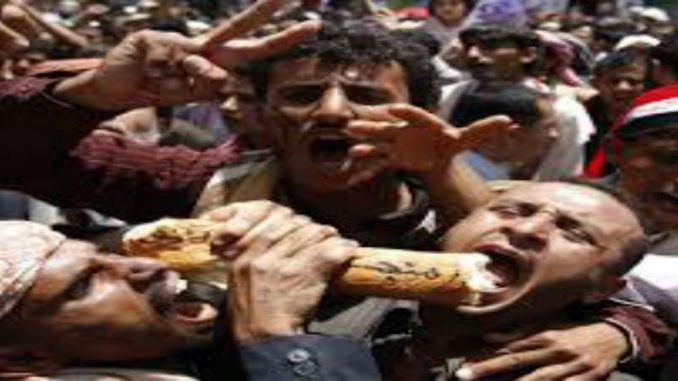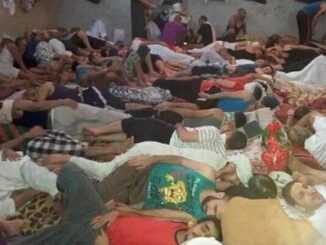
Egyptians experience food insecurity as the country ranks third place among Arab countries on the Global Hunger Index for 2016, and in 59th place among 118 countries surveyed, according to the Central Agency for Public Mobilization And Statistics (CAPMAS).
In the same context, a study by CAPMAS on the economics of food security in Egypt pointed to the rising deficit rate of the wheat crop from 6.4 million tons to 10 million tons during the period from 2006 to 2015, marking a 55.7% increase in the deficit.
It also showed a decline in Egypt’s self-sufficiency rate for wheat, from 56.4 %to 49.1 %. The average individual share went down from 192.4kg to 173kg annually, according to the study.
It also indicated a decline in the excess amount of rice crop during the same period from 976,000 tons to 141,000 tons, marking an 85.6 percent drop.
The self-sufficiency rate went down from 126.5 to 102.6 %, while the average individual share rose from 48.3kg to 57kg annually, marking an 18 %increase.
In addition to food deficit, high prices of food threatens the lives of millions of Egyptians.
A former accountant, Ali El Sayed , 60-year-old,said“Cooking oil is more expensive, the sugar too, and now the bread. how are we supposed to eat?”
He added,“The worst thing is to be unable to feed your family. No one feels the suffering we live in.”
It is worth to mention that the Egyptian government has cut food subsidies several times in the last few months, causing anger and frustration for 70 million Egyptians that benefit from the ration system.
Earlier this month, Egyptians protested in Alexandria and Giza against the latest bread subsidy cuts, chanting “we want bread” and “everything but a loaf”.
Egypt’s Ministry of Supplies has reduced the daily quota of subsidized bread loaves to 500 instead of between 1,000 and 4,000 loaves a day; though a separate electronic card scheme was not affected.
In response the supply minister Ali Moselhy pledged to resolve the bread issue within 48 hours in an attempt to curb protests, but the government is still defending the decision to reduce subsidies.
Many Egyptians still criticize about expensive goods that disabled them from obtaining certain types of food.
Saied Nabil, a 50-year-old government employee currently living in Alexandria, said“We forgot about meat and other expensive food, but we cannot forget bread.”
He added,“Bread is essential in all of our meals. It’s been part of our diet for ages,” he added.
Sayed receives a monthly pension of 947 Egyptian pounds ($50). He needs to buy 10 loaves of bread per day from local markets to ensure that his entire family is fed, but their prices are much higher than state-run shops.
The loaf of bread cost ranges from 30-75 piasters, depending on size and quality. However, each loaf costs approximately five piasters based on the government’s subsidies program.
In the same context, Rashad is an employee in the buffet service of a private company and earns 1600 Egyptian pounds ($100 dollars) a month.
Rashad is constantly in debt because of being forced to buy essential food at markets for higher prices, rather than depending on the subsidized food prices.
Since Egypt floated its currency in November after securing a $12 billion loan from the IMF, its core inflation has soared above 30 %.
Both traders and customers said that there are shortages in several subsidized products. For instance,each client holding a ration card cannot buy more than one bag of sugar at the time being because of a severe sugar crisis.
An employee affiliated with the Ministry of Supply, who preferred to remain anonymous , said“Most of the subsidized products are not available especially sugar.”
“People have no choice but to resort to buying more expensive products from local markets,” he added.
The government raised the prices of subsidized sugar and cooking oil for the second time in three months last February which led to an increase of 14.3 %: from seven to eight Egyptian pounds a kilo of subsidized sugar (about 40 %).
In addition, the price of subsidized cooking oil rose by 20% as it increased from 10 (0.55 cents) to 12 Egyptian pounds (0.66 cents).
Safia, a 62-year-old housewife, said that her husband’s monthly pension of 900 Egyptian pounds ($50) no longer suffices to feed her and her family.
She said, “I don’t know how we can live. This is hard. So hard and unfair.”
In the meantime, in front of a state-run subsidized food complex, old women are waiting in line to get their share of food.
Mona Hussein, a 60-year-old mother of two, also complained about the constant hike in food prices. Her husband works as a doctor in a private hospital in Cairo and the family depends on his monthly income of 6,000 pounds ($375).
Although they have previously considered themselves part of the middle class, however as prices continue to increase and wages remain stagnant, they have went below the middle class level.
She said,“I’m very upset and angry. We are no longer a middle class.”
According to a report released in January, food prices have been going up 38.6% annually.
She said,“I think I never buy the same item with the same price twice. Every day there is a change.” She added,“We cannot afford this and I don’t know for how long we can bear it.”
Egypt’s military ruler, who promised prosperity and stability, failed to fulfill his promises as the country has been facing one of the harshest economic downfall in its history under his rule.
Al-Sisi launched a bloody military coup against Egypt’s first democratically elected president Mohamed Morsi.
Under his reign, tourism and foreign investments, which were the two major resources of hard currency, have withdrawn as a result of political unrest and security instability.
As a result, the Central Bank of Egypt (CBE) devalued the Egyptian currency in March.
The devaluation of the Egyptian pound and the shortage of foreign currency have flourished the black market on the currency expense.
In this context, Abdel Fattah al-Sisi has chosen to take the Egyptian people through the hard path by seeking to secure a loan from the International Monetary Fund(IMF).
In this context, Egypt’ s al-Sisi has worked to fulfill the IMF economic reform program to secure the loan.
Last November, the International Monetary Fund’s executive board has approved Egypt’s request to secure $12 billion loan facility after Egypt met its requirements.
On August 30 Egypt started its first steps towards the loan when Egypt’s parliament approved a long-awaited law introducing a value-added tax (VAT) of 13 %, rising to 14% in the next fiscal year.
On November 3, the Central Bank of Egypt floated the Egyptian pound and gave up trying to peg the currency to the US dollar allowing it to devalue by almost half.
On November 4, Egypt took another unprecedented decision, which has always been abandoned by former leaders in fear of public unrest, to cut subsidies for fuel leading to jump in prices, in addition to the introduction of the value-added tax to raise revenues.
Abdel Fattah al-Sisi has said before that he would not hesitate “for one second” to take the difficult steps necessary to ensure Egypt lives within its means.
In this context, last December Al-Sisi asked the Egyptian people to endure hardships and austerity for the next six months.
It is worth to mention All Egypt’s presidents tend to avoid these economic measures of the IMF recalling poor Egyptians riot when President Anwar Sadat removed them on flour, rice, and oil in 1977, part of an effort to secure IMF-backed financing.
He reinstated later from the decision. Though Egypt has returned to the IMF virtually every decade since the 1970s, implementation of reforms has been mixed.
In the end, as food crisis in Egypt is increasing day by day, dangers are not lost on Abdel Fattah al-Sisi,“ in a country where economic discontent has helped unseat two presidents in five years,” said Reuters.
In December, the Financial Times stated that Egypt’s rule is the worst under al-Sisi regime an article titled “Sisi’s Egypt: The march of the security state.” FT said that Egypt’s “social and economic problems are deeper than ever under the former general’s regime.”
In the same context, last August, the Economist highlighted al-Sisi as the one who is responsible for the ruining of Egypt in its editorial titled: The Ruining of Egypt…Repression and the incompetence of al-Sisi are stoking the second uprising.”
The magazine said at the end of its editorial that the demographic, economic and social pressures in Egypt are relentlessly increasing and that al-Sisi is incapable of providing the sustainable stability to Egypt, the political regime also needs to be reopened.
The magazine considered al-Sisi’s withdrawal from the political life is the hope gate for the Egypt. The Economist continued saying, “Egypt’s political system needs to be reopened. A good place to start would be for al-Sisi to announce that he will not stand again for election in 2018.”



